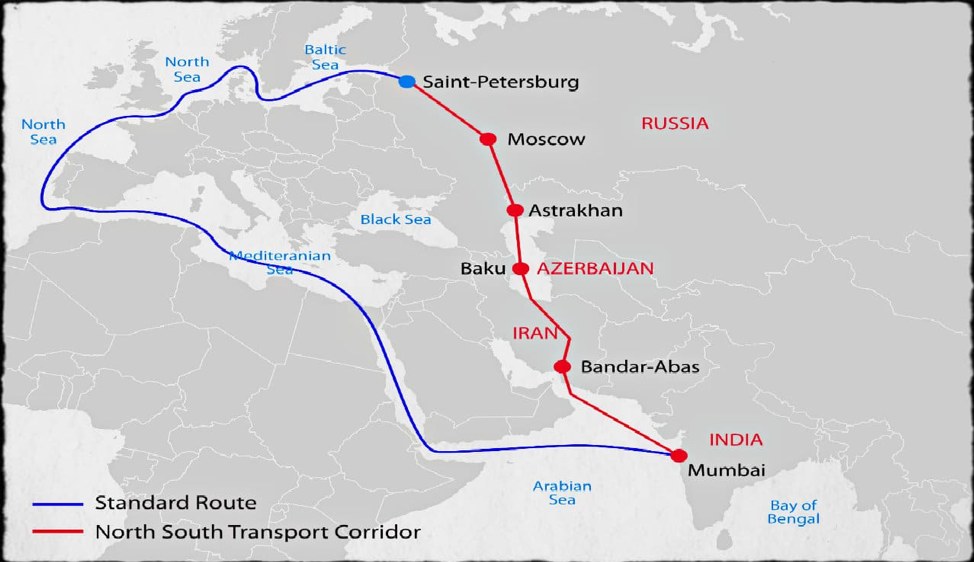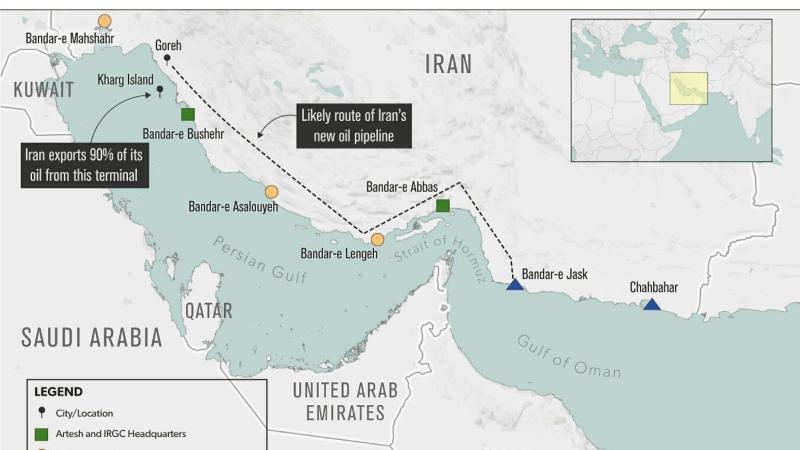Abstract: The Goreh-Jask oil pipeline will presumably decrease or eliminate Iran’s dependence on the Strait of Hormuz, allowing Teheran the possibility to expand the presence of its national army and Islamic Revolutionary Guard Corps in the area. This would be through infrastructural projects along with soldier deployments. Taking into consideration the United States (U.S.) and Saudi activities in the region, if Iranian interests and national development projects majorly impact the regional dynamics and cause negative consequences for Tehran’s enemies, it is feasible to predict a future confrontation. Pointedly, it would not only be realized in economic markets but similarly, in the military field.
Bottom-line-up-front: The Goreh-Jask oil pipeline plays a fundamental role in Iran’s national economic development program and provides Tehran with a geopolitical lever to control the Strait of Hormuz and counter the U.S. strategy in the region.
Problem statement: How can the geopolitical value of the Iranian Goreh-Jask oil pipeline be assessed in light of U.S. sanctions and the strategic bottleneck in the Strait of Hormuz?
So what?: The United States cannot underestimate the Iranian relations with Russia, China, and Pakistan that have increased since the White House’s aggressive policy against Tehran. Instead of putting pressure on Iran through sanctions and covert military operations in the Middle East, it is advisable that the United States will prefer a diplomatic approach to avoid a violent escalation in the Strait of Hormuz whose consequences might deeply affect the international business, therefore the U.S. commercial interests.

Source: IranDefence (2020) Iran’s Leverage over the Strait of Hormuz, Pakistan Defence.
During the nationwide meeting with Iranian government officials, President Hassan Rouhani stressed that the U.S. sanctions are an opportunity for national change and have highlighted the ability of Iranian citizens in dealing with external threats and their resilience. Washington’s sanctions should have severely damaged the Iranian economy and affected its national economic growth, however, the situation played out in an unexpected manner. Iran witnessed significant changes such as the expansion of communication and Internet infrastructures, the development of its railway system, and the increase of gas supplies to villages and sustainable drinking water for the rural population.[1]
On March 21st, 2021, Iran celebrated the new Islamic calendar year. Ayatollah Khomeini designated the year 1400 (according to the Islamic calendar based on hegira) to be one of ‘Production, support, and removal of obstacles’ with the goal of boosting economic growth. In this context, the Goreh-Jask oil pipeline is one of the most important national infrastructural projects that was launched to support Iran’s economic development in addition to Tehran’s domestic and foreign policy.
The Goreh-Jask oil pipeline is one of the most important national infrastructural projects that was launched to support Iran’s economic development in addition to Tehran’s domestic and foreign policy.
Essentially, the pipeline will transport oil from the southwestern province of Bushehr in Genaveh county to the Jask terminal crossing through the provinces of Fars and Hormuzgan. The infrastructure, which is 1000 kilometres in length and 42 inches in diameter, costs about 2 billion dollars and will allow Iran to overcome the issue of the Strait of Hormuz being a critical bottleneck. It is equally purposed to transfer most of the national oil exports from the Persian Gulf to the Gulf of Oman. According to forecasts, the project will enable the transfer of one million barrels of oil per day from the Jask port terminal. The pipeline includes five pumping stations, two pigging stations and terminals, and 20 tanks with a capacity of 10 million barrels of oil as well as offshore facilities for export.[2]
The Iranian President welcomed the pipeline seeing as it will guarantee the continuation of oil exports while bypassing issues related to either sanctions or the Strait of Hormuz’s safety. Likewise, the Goreh-Jask oil pipeline has the potential to create a climate of greater confidence and trust among foreign buyers of Iranian oil.
The Strait of Hormuz is a waterway that divides the Arabian Peninsula from the coasts of Iran, through which almost a third of the world’s oil trade passes. Almost all Iranian oil is extracted near the Persian Gulf. It is loaded onto tankers on the island of Khark (25 kilometres from the country’s coast) and transported across the Strait of Hormuz to the Gulf of Oman where it can be freely exported. This should serve assist in understanding the devastating impact a potential closure of the Strait of Hormuz might have on Iranian exports and the consequential necessity for Tehran to find an alternative route.
The Goreh-Jask oil pipeline not only targets issues related to the Strait of Hormuz and increases Iranian exports, it also represents Tehran’s geopolitical advantage/leverage to create discomfort or problems in other countries’ exports in the region without negatively affecting its national trade.[3]
Correspondingly, the pipeline offers several economic and logistical benefits. In fact, Iran can continuously export its national oil, which would encourage foreign investors to be more involved in its energy market and considerably reduce the distance oil tankers travel to consumer markets. Besides that, such an infrastructure could create new jobs, contrast the U.S. sanctions, and circumvent Washington’s military presence in the Strait of Hormuz.
One should also consider that the Jask terminal has an essential role in trading oil with Caspian countries and the importation of Turkmen gas. The oil pipeline will relate to the Gulf Star refinery, permitting the exportation of oil and gas condensate from the Jask terminal. Furthermore, the terminal is located near the International North-South Transport Corridor, a network of routes that will connect Russia and India, passing through Azerbaijan and Iran.

Source: League of India (2018) India, Iran, Russia want to create alternative trade route to Suez Canal
The Goreh-Jask oil pipeline project has both Iranian and international investors, including the Russian Sberbank, the Russian engineering company Rosneftegazstroy and the Russian State development company VEB. Among other investors are the German engineering company Marcon Ingenieurgesellschaft and the Greek firm Archirodon which provides services in the construction and maintenance of maritime infrastructures. The CEO of the Iranian Petroleum Engineering and Development company stated that the construction of the pipeline has progressed to 80%.[4]
This project is an example of Tehran’s policies in place to enhance the petrochemical sector and improve the region’s national geopolitical influence. Despite regional analysts deeming it impossible for Iran to close the Strait of Hormuz, it should be noted that this eventuality might have a catastrophic impact on the energy market, and increase oil prices.
Despite regional analysts deeming it impossible for Iran to close the Strait of Hormuz, it should be noted that this eventuality might have a catastrophic impact on the energy market, and increase oil prices.
In this framework, one has to consider the rising tensions between the Gulf countries and Iran taking into account that Saudi Arabia is pursuing its nuclear energy program with Chinese support.[5]
At the same time, Riyadh is attempting to normalize bilateral relations with Tel Aviv. As such, the confrontation between Washington and Tehran cannot be underestimated. Especially considering the fact that the White House has aggravated its sanctions against Iran during the global pandemic, which can be perceived as trying to severely hit Iran’s national economy and exacerbate its society. Moreover, the United States is leading one of the coalitions (composed of Gulf countries and several European countries) that oversee and control the security of the Strait of Hormuz. This pushes Tehran into the arms of Moscow in pursuit of establishing another coalition that is capable of contrasting the Western/Gulf strategy.
In conclusion, it is legitimate to infer that the Goreh-Jask oil pipeline will reduce or eradicate Iran’s dependence on the Strait of Hormuz. This would also grant Teheran the possibility to expand the presence of its national army and the Islamic Revolutionary Guard Corps in the area through infrastructural projects and soldier deployments. With the U.S. and Saudi activities in the region, if Iranian interests and national development projects largely influence regional dynamics and cause negative consequences for Tehran’s enemies, it is possible to presume a future confrontation not only in economic markets but also in the military field.
Silvia Boltuc is a political analyst specialized in international relations, geopolitics, and energy markets. Currently, she runs the “Eurasian energy market” project for ASRIE Analytica while being research manager at the Department of Energy & Engineering which belongs to the Italian think tank – Centre of Study Eurasia Mediterranean Sea (CeSEM). She is also an editor at the Notiziegeopolitiche.net media agency. The views contained in this article are the author’s alone.
[1] “Iran vows to take ‘any opportunity’ to lift US sanctions,” Arab News, last accessed April 08, 2021, https://www.arabnews.com/node/1761586/middle-east.
[2] “Goreh-Jask Crude Oil Pipeline,” NS Energy, last accessed April 08, 2021, https://www.nsenergybusiness.com/projects/goreh-jask-crude-oil-pipeline/.
[3] “Jask Oil Terminal and Pipeline Project,” Hydrocarbons Technology, last accessed April 08, 2021, https://www.hydrocarbons-technology.com/projects/jask-oil-terminal-pipeline-project/.
[4] “Goreh-Jask Crude Oil Pipeline,” NS Energy, last accessed April 08, 2021, https://www.nsenergybusiness.com/projects/goreh-jask-crude-oil-pipeline/.
[5] Silvia Boltuc, “Saudi Vision 2020, energy diversification and the Saudi nuclear program,” Geopolitical Report (2021), Vol.3, 33-47.






